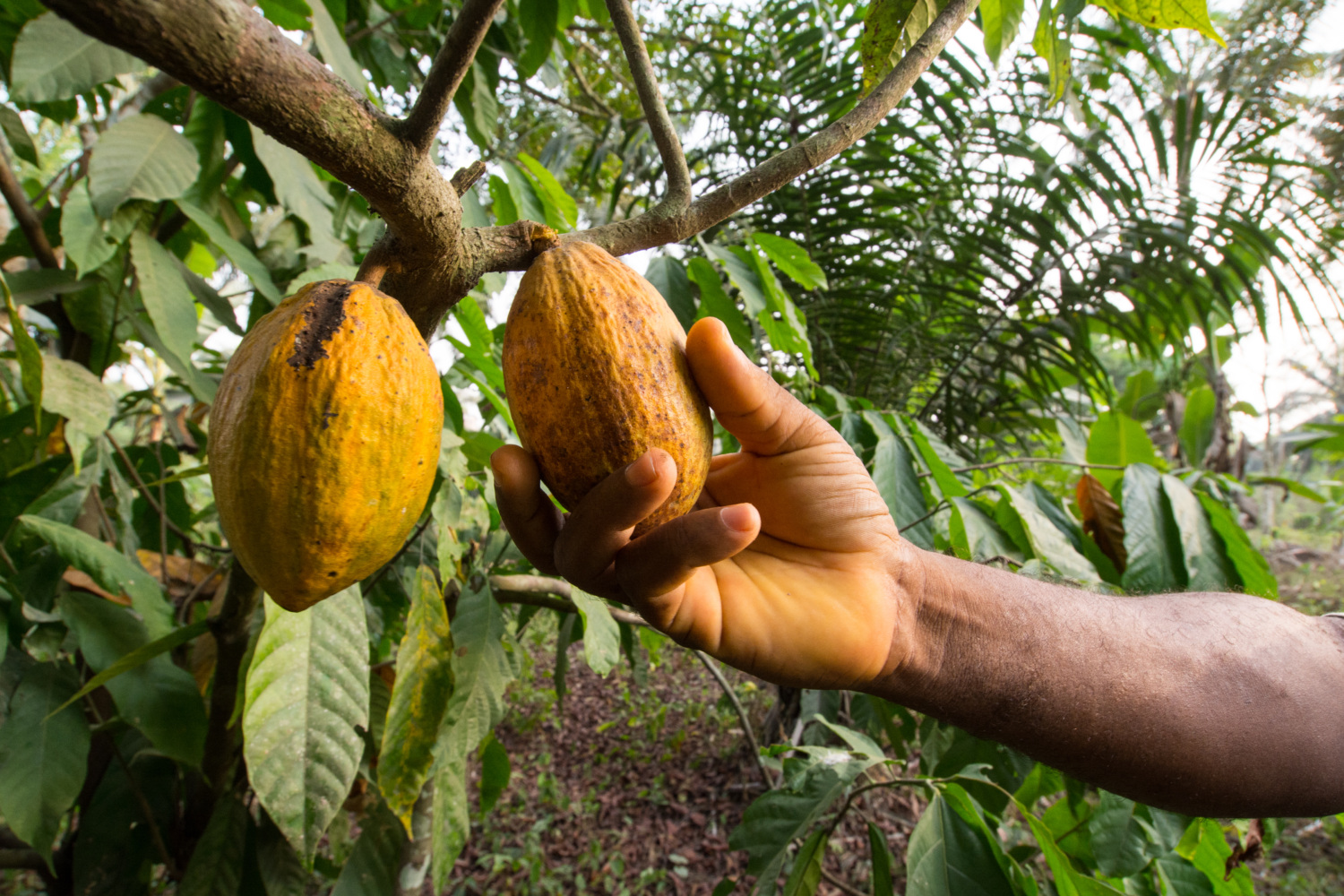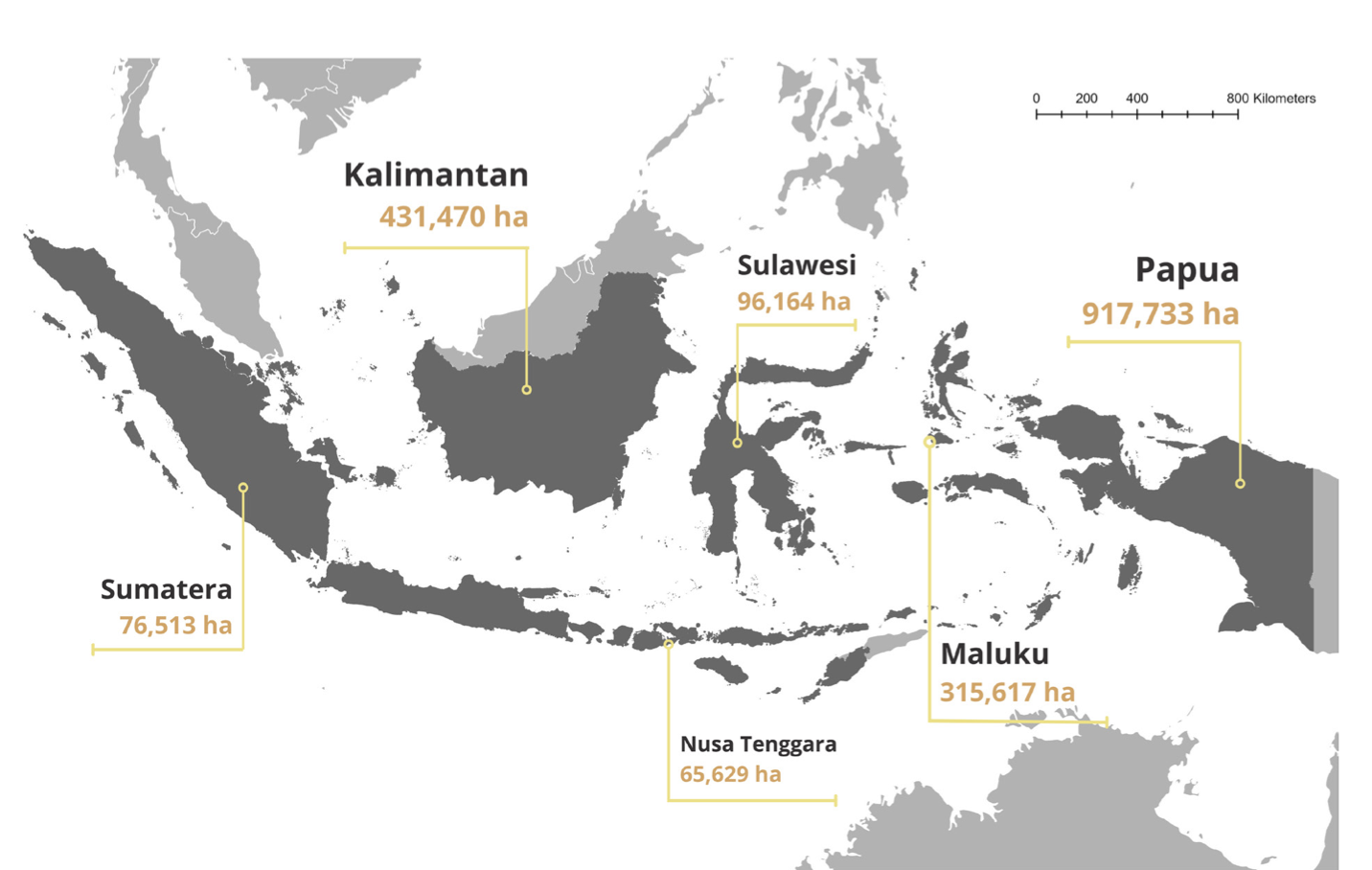
Cameroon on the brink: cocoa boom risks country becoming next deforestation hotspot
Read in French here
Download the report here
Mighty Earth_Cameroon_Cocoa_Deforestation_Report_July 2025A new report by Mighty Earth, “Cameroon on the brink: Cocoa’s New Deforestation Frontier,” reveals that Cameroon is becoming the next major hotspot for cocoa-driven deforestation. As productivity declines in Ghana and Côte d’Ivoire due to global heating, crop disease, and outdated farming practices, Cameroon’s cocoa industry is booming, increasing the threat to the country’s forests and wildlife. Mighty Earth is sounding the alarm that without urgent action by the Cameroonian government, cocoa companies and the EU there is a major risk of deforestation spreading as it has done in Ghana and Cote d’Ivoire leading to massive forest loss in those key producing countries.
Surging deforestation
Cameroon is now the world’s fifth-largest cocoa producer and has set a goal to triple production by 2030—a move that is increasing pressure on the country’s forests and hugely biodiverse ecosystems. The report highlights that 2024 marked the highest year of forest loss in Cameroon to date, with some districts having lost as much as 43% of their forest coverage since 2020. A surge in cocoa-driven deforestation near Nkondjock district, which is adjacent to the Ebo Wildlife Reserve, poses a risk to the habitat of critically endangered charismatic megafauna such as Western Lowland Gorillas and Forest Elephants.
Thea Parson, Senior Associate at Mighty Earth and co-author of the report, said:
“Cameroon’s cocoa boom risks the country becoming the next deforestation hotspot, with our analysis showing a big surge in forest loss last year, just as the EUDR is set to reshape the global cocoa market. We’ve already seen the devastating impact of unchecked cocoa expansion in Côte d’Ivoire and Ghana: destroyed forests, deepening farmer poverty, and vanishing wildlife. To safeguard Cameroon’s access to its biggest market, the EU, and prevent further forest loss, farmers need to be better supported to improve practices, meet EUDR compliance and be fairly compensated. The EUDR gives Cameroon a chance to take a different path—but only if companies act now to ensure full traceability. So far, they are falling short.”
Falling short on EUDR compliance
Analysis in the report reveals that cocoa companies still lack visibility into their Cameroonian supply chains and are falling short in building the traceability systems needed for the compliance required by the incoming European Union Deforestation Regulation (EUDR), which was adopted in 2023 and requires farm-level geolocation data to prevent cocoa expansion into forest areas. The European Union (EU) is Cameroon’s largest export market, with 80% of the country’s cocoa exported to the EU during the 2023/24 season.
The EUDR offers Cameroon the best opportunity to address these traceability issues and protect its forests. But unless there is urgent and coordinated action from companies, the EU and the Cameroonian government to prepare for enforcement, Cameroonian smallholders risk being cut off from their largest market when the legislation takes effect on December 30th 2025.
Farmer poverty
Despite relatively higher farmgate prices in Cameroon than in Ghana or Côte d’Ivoire, 69% of cocoa farming households live below the poverty line, with farmers receiving less for their beans due to the dominance of “coxeurs.” These intermediaries take substantial margins, leaving farmers underpaid and perpetuating a supply chain that remains opaque and difficult to trace. In this system, beans from deforested areas are often mixed with those from monitored farms, further eroding traceability and threatening companies’ deforestation-free sourcing commitments.
Over the past decade, major cocoa traders such as Cargill, Barry Callebaut, and Olam—and chocolate manufacturers including Hershey’s, Godiva, and Nestle have publicly committed to achieving deforestation-free supply chains, many by 2025 or earlier. Despite these pledges and ongoing efforts to build a national traceability system in Cameroon, the findings in Mighty Earth’s report show that real-world implementation continues to lag far behind corporate commitments.
Celestin Tina Biyo’o, Deputy National Coordinator of Programs at CODED Cameroon said:
“The lessons learned from past failures in the timber sector must serve as a guide to avoid repeating in the Cameroon’s cocoa sector. By adapting the EUDR to the local realities and strengthening the capacities of producers, it is possible to create a framework that promotes both sustainability and economic prosperity in the cocoa sector in Cameroon.”
“Through coordinated action, we are confident that it is possible to support Cameroonian cocoa producers in meeting this challenge and adapting to the new requirements of the European market. It is also essential to implement effective monitoring and control systems to ensure that agricultural practices comply with environmental and social standards, with the aim of preserving both the environment and the livelihoods of small-scale producers.”
Amourlaye Touré, Senior Advisor for Africa at Mighty Earth said:
“Cocoa-driven deforestation is fundamentally linked to poverty—when farmers can’t earn enough from existing land, expanding into forests becomes a survival strategy. With most farmers in Cameroon living below the poverty line, direct financial incentives— such as better prices for deforestation-free cocoa or technical assistance to boost yields are critical to protecting Cameroon’s forests and the critically endangered wildlife that live there. And to avoid a repeat of the massive forest loss the cocoa industry has driven in Ghana and Cote d’Ivoire.”
Mighty Earth is calling for:
- Companies to investigate and disclose deforestation risk; publish farm-level maps and supply chain data; integrate coxeurs into traceability systems and ensure a living wage for farmers.
- The Cameroonian government to develop a national cocoa management system; release mapped farm boundaries; incentivize cocoa growing on degraded land and regulate coxeurs.
- The EU to scale up technical and financial assistance for EUDR compliance; monitor and enforce compliance and work with the Cameroonian government and all stakeholders across the cocoa industry.
Notes to editors:
- Since 2020, RADD alerts have recorded 782,797 hectares of forest loss in Cameroon, equivalent to 4.2% of the country’s total forest cover. In the past five years alone, 64 districts have lost at least 10% of their forests; 21 have lost more than 20%, 5 exceeded 30% and 2 lost more than 40% of their remaining forests.
- Logging is the primary driver of deforestation in Cameroon, with local farmers moving into plant cocoa once land is cleared.
- “Cameroon on the brink: Cocoa’s New Deforestation Frontier,” recommends that the coxeur sourcing network is regulated with licensing, price transparency, and minimum documentation requirements to bring coxeurs into formal oversight structures.
